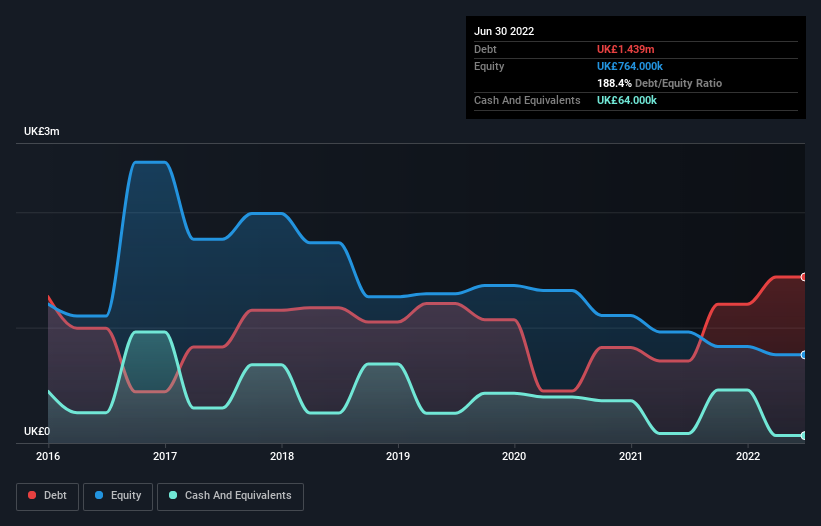- United Kingdom
- /
- Professional Services
- /
- AIM:NBB
Would Norman Broadbent (LON:NBB) Be Better Off With Less Debt?

Warren Buffett famously said, 'Volatility is far from synonymous with risk.' It's only natural to consider a company's balance sheet when you examine how risky it is, since debt is often involved when a business collapses. We note that Norman Broadbent plc (LON:NBB) does have debt on its balance sheet. But is this debt a concern to shareholders?
Why Does Debt Bring Risk?
Debt is a tool to help businesses grow, but if a business is incapable of paying off its lenders, then it exists at their mercy. Part and parcel of capitalism is the process of 'creative destruction' where failed businesses are mercilessly liquidated by their bankers. However, a more common (but still painful) scenario is that it has to raise new equity capital at a low price, thus permanently diluting shareholders. Having said that, the most common situation is where a company manages its debt reasonably well - and to its own advantage. When we think about a company's use of debt, we first look at cash and debt together.
Check out the opportunities and risks within the GB Professional Services industry.
How Much Debt Does Norman Broadbent Carry?
You can click the graphic below for the historical numbers, but it shows that as of June 2022 Norman Broadbent had UK£1.44m of debt, an increase on UK£711.0k, over one year. However, because it has a cash reserve of UK£64.0k, its net debt is less, at about UK£1.38m.

A Look At Norman Broadbent's Liabilities
According to the last reported balance sheet, Norman Broadbent had liabilities of UK£2.71m due within 12 months, and liabilities of UK£425.0k due beyond 12 months. Offsetting these obligations, it had cash of UK£64.0k as well as receivables valued at UK£2.00m due within 12 months. So it has liabilities totalling UK£1.07m more than its cash and near-term receivables, combined.
While this might seem like a lot, it is not so bad since Norman Broadbent has a market capitalization of UK£2.43m, and so it could probably strengthen its balance sheet by raising capital if it needed to. However, it is still worthwhile taking a close look at its ability to pay off debt. There's no doubt that we learn most about debt from the balance sheet. But it is Norman Broadbent's earnings that will influence how the balance sheet holds up in the future. So if you're keen to discover more about its earnings, it might be worth checking out this graph of its long term earnings trend.
Over 12 months, Norman Broadbent reported revenue of UK£7.4m, which is a gain of 14%, although it did not report any earnings before interest and tax. That rate of growth is a bit slow for our taste, but it takes all types to make a world.
Caveat Emptor
Over the last twelve months Norman Broadbent produced an earnings before interest and tax (EBIT) loss. Indeed, it lost UK£136k at the EBIT level. When we look at that and recall the liabilities on its balance sheet, relative to cash, it seems unwise to us for the company to have any debt. Quite frankly we think the balance sheet is far from match-fit, although it could be improved with time. However, it doesn't help that it burned through UK£991k of cash over the last year. So in short it's a really risky stock. There's no doubt that we learn most about debt from the balance sheet. However, not all investment risk resides within the balance sheet - far from it. For instance, we've identified 2 warning signs for Norman Broadbent that you should be aware of.
If you're interested in investing in businesses that can grow profits without the burden of debt, then check out this free list of growing businesses that have net cash on the balance sheet.
Valuation is complex, but we're here to simplify it.
Discover if Norman Broadbent might be undervalued or overvalued with our detailed analysis, featuring fair value estimates, potential risks, dividends, insider trades, and its financial condition.
Access Free AnalysisHave feedback on this article? Concerned about the content? Get in touch with us directly. Alternatively, email editorial-team (at) simplywallst.com.
This article by Simply Wall St is general in nature. We provide commentary based on historical data and analyst forecasts only using an unbiased methodology and our articles are not intended to be financial advice. It does not constitute a recommendation to buy or sell any stock, and does not take account of your objectives, or your financial situation. We aim to bring you long-term focused analysis driven by fundamental data. Note that our analysis may not factor in the latest price-sensitive company announcements or qualitative material. Simply Wall St has no position in any stocks mentioned.
About AIM:NBB
Norman Broadbent
Provides professional services in the United Kingdom and internationally.
Good value with adequate balance sheet.

